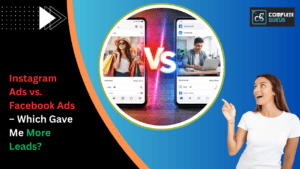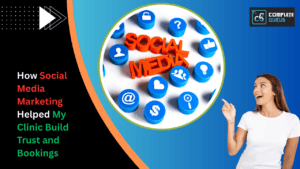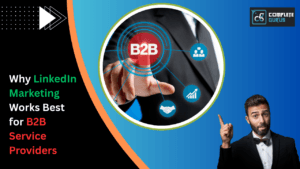In today’s digital age, therapy centers are discovering the transformative power of online marketing. The internet isn’t just a place for entertainment or shopping; it’s where people seek help, comfort, and solutions to their problems. For therapy centers, this means an unprecedented opportunity to reach those in need. Whether you’re a small practice or a larger facility, effective digital marketing strategies can significantly impact your reach and success. Let’s dive into some of the most effective Digital marketing strategies tailored for therapy centers.
Understanding the Digital Landscape for Therapy Centers
Before we get into specific strategies, it’s essential to understand the digital landscape therapy centers operate within. The target audience for therapy centers includes individuals and families seeking mental health support. They often turn to the internet for information, reviews, and connections with professionals who can help them.
Why Digital Marketing Matters for Therapy Centers:
- Accessibility: Digital platforms make it easier for potential clients to find you.
- Credibility: A strong online presence can build trust and credibility.
- Engagement: Engaging with your audience online can foster a sense of community and support.
- Cost-Effective: Compared to traditional marketing, digital marketing can be more cost-effective, offering a higher return on investment.
1. Building a User-Friendly Website
Your website is the cornerstone of your digital presence. It’s often the first impression potential clients have of your therapy center, so it needs to be professional, informative, and easy to navigate.
Key Elements of an Effective Therapy Center Website:
- Clear Information: Include details about the services you offer, your team, and how to get in touch.
- Blog Section: Regularly update your blog with articles on mental health topics. This not only provides value to visitors but also boosts your SEO.
- Client Testimonials: Showcase positive feedback from past clients to build trust.
- Contact Forms: Make it easy for potential clients to reach out with simple and accessible contact forms.
- Mobile Optimization: Ensure your website is mobile-friendly, as many users will visit from their phones.

2. Search Engine Optimization (SEO)
SEO is crucial for making sure your therapy center appears in search engine results when potential clients are looking for services you offer.
Effective SEO Strategies:
- Keyword Research: Identify and use relevant keywords that potential clients are likely to search for, such as “therapy center near me,” “mental health counseling,” and “online therapy sessions.”
- On-Page SEO: Optimize your website’s content, meta descriptions, headings, and images for these keywords.
- Local SEO: Ensure your therapy center is listed on Google My Business and other local directories. Encourage satisfied clients to leave positive reviews.
- Backlinks: Build high-quality backlinks from reputable websites in the mental health field to improve your site’s authority.
3. Content Marketing
Content marketing involves creating and sharing valuable content to attract and engage your target audience. For therapy centers, this can be particularly powerful.
Types of Content to Create:
- Blog Posts: Write articles on topics like coping with anxiety, the benefits of therapy, and how to choose a therapist.
- Video Content: Create videos that explain your services, introduce your therapists, and share client success stories (with permission).
- E-books and Guides: Offer free downloadable resources on mental health topics in exchange for visitors’ email addresses.
- Webinars: Host webinars on mental health topics to establish your center as an authority and provide value to your audience.
4. Social Media Marketing
Social media is a powerful tool for reaching potential clients and engaging with your community. Each platform offers unique opportunities to connect with different segments of your audience.
Effective Social Media Strategies:
- Choose the Right Platforms: Focus on platforms where your target audience is most active, such as Facebook, Instagram, and LinkedIn.
- Consistent Posting: Regularly share content, including blog posts, mental health tips, client testimonials, and updates about your services.
- Engage with Followers: Respond to comments and messages promptly. Show empathy and understanding in your interactions.
- Advertising: Use targeted ads to reach specific demographics and promote your services.
5. Email Marketing
Email marketing is an excellent way to maintain ongoing communication with your clients and prospects. It allows you to nurture relationships and keep your audience informed about your services.
Effective Email Marketing Strategies:
- Build a Quality List: Collect email addresses through your website, social media, and in-person interactions. Ensure you have permission to send emails.
- Segment Your Audience: Divide your email list into segments based on factors like interests, demographics, and past interactions. This allows for more personalized content.
- Regular Newsletters: Send out regular newsletters with updates, blog highlights, upcoming events, and mental health tips.
- Automated Emails: Set up automated email sequences for new subscribers, appointment reminders, and follow-ups after sessions.

6. Online Advertising
While organic strategies are crucial, online advertising can give your therapy center an additional boost. Platforms like Google Ads and social media ads can help you reach a broader audience.
Effective Online Advertising Strategies:
- Google Ads: Use Google Ads to target people searching for therapy services in your area. Focus on both search and display ads.
- Social Media Ads: Run ads on Facebook, Instagram, and LinkedIn to promote your services, special offers, and events.
- Retargeting: Use retargeting ads to reach people who have visited your website but didn’t take action. This can remind them of your services and encourage them to reach out.
7. Online Directories and Listings
Listing your therapy center in online directories can improve your visibility and make it easier for potential clients to find you.
Effective Directory Listing Strategies:
- Google My Business: Claim and optimize your Google My Business listing. Ensure your information is accurate and encourage reviews.
- Mental Health Directories: List your center on mental health directories like Psychology Today, Good Therapy, and Therapy Tribe.
- Local Directories: Don’t overlook local business directories and community websites. These can drive local traffic to your website.
8. Online Reputation Management
Your online reputation can significantly impact your therapy center’s success. People often look at reviews and testimonials before deciding to reach out for therapy services.
Effective Online Reputation Management Strategies:
- Encourage Reviews: Ask satisfied clients to leave reviews on Google, Yelp, and mental health directories.
- Monitor Reviews: Regularly check reviews and respond professionally to both positive and negative feedback.
- Address Negative Reviews: Address negative reviews calmly and professionally. Offer solutions and show that you care about resolving issues.
- Showcase Testimonials: Highlight positive testimonials on your website and social media.

9. Teletherapy Services
In the wake of the COVID-19 pandemic, teletherapy has become increasingly popular. Offering online therapy sessions can expand your reach beyond your local area.
Effective Teletherapy Marketing Strategies:
- Highlight Teletherapy Services: Clearly promote your teletherapy services on your website and social media.
- Educational Content: Create content that explains how teletherapy works, its benefits, and how to get started.
- SEO for Teletherapy: Optimize your website for keywords related to online therapy and telehealth services.
- Teletherapy Platforms: Ensure you’re listed on teletherapy platforms that potential clients might use to find online therapy providers.
10. Analytics and Continuous Improvement
Finally, one of the most important aspects of digital marketing is tracking your efforts and continuously improving your strategies based on data.
Effective Analytics Strategies:
- Google Analytics: Use Google Analytics to track your website traffic, user behavior, and conversion rates.
- Social Media Insights: Monitor the performance of your social media posts and ads to see what’s working and what’s not.
- Email Marketing Metrics: Track open rates, click-through rates, and conversion rates for your email campaigns.
- Regular Reviews: Regularly review your marketing strategies and adjust based on the data. This might involve tweaking your SEO tactics, changing your ad targeting, or experimenting with different types of content.
FAQ 1. How can a therapy center improve its online presence without spending a lot of money?
Ans: Great question! Many therapy centers, especially smaller ones, might feel constrained by a tight budget when it comes to digital marketing. But the good news is, there are several cost-effective strategies that can make a big impact:
- Optimize Your Website: Start with the basics. Ensure your website is easy to navigate, mobile-friendly, and provides clear information about your services. Include a blog with regular updates on mental health topics, which can boost your SEO without additional costs.
- Leverage Social Media: You don’t need a huge budget to make a splash on social media. Create profiles on platforms where your audience is active—Facebook, Instagram, LinkedIn—and share engaging content regularly. Posts about mental health tips, success stories (with permission), and updates about your services can generate significant engagement.
- Email Marketing: Building an email list and sending regular newsletters is a cost-effective way to stay in touch with your audience. Use your website to collect email addresses and segment your list to send personalized content.
- Local SEO: Ensure your therapy center is listed on Google My Business and other local directories. This helps you appear in local searches without the need for paid ads. Encourage satisfied clients to leave positive reviews, which can enhance your credibility and visibility.
By focusing on these low-cost strategies, you can effectively enhance your online presence and attract more clients.
FAQ 2. What content should a therapy center focus on creating to engage potential clients?
Ans: Content is king in the digital marketing world, especially for therapy centers. Creating and sharing valuable content helps establish your center as a trusted authority in mental health and can attract and engage potential clients. Here are some ideas to get you started:
- Blog Posts: Write articles on common mental health issues, coping strategies, and the benefits of therapy. Topics like “How to Deal with Anxiety” or “Signs You Might Need Counseling” can be very relatable and helpful.
- Video Content: Videos are highly engaging and can help build a personal connection with potential clients. Consider creating videos that introduce your therapists, explain different types of therapy you offer, or share client success stories (with permission).
- E-books and Guides: Offering free resources like e-books or guides on topics such as “Managing Stress” or “Understanding Depression” can provide valuable information to your audience and collect email addresses for future marketing.
- Webinars: Host live or recorded webinars on mental health topics. This not only provides valuable information but also allows potential clients to see your expertise in action.
- Social Media Posts: Share short, informative posts, infographics, and quotes on mental health topics. Engage with your followers by asking questions and encouraging them to share their thoughts.
By focusing on these types of content, you can provide real value to your audience, build trust, and encourage potential clients to reach out for your services.
FAQ 3. How can therapy centers measure the success of their digital marketing efforts?
Ans: Measuring the success of digital marketing efforts is crucial to understanding what works and what doesn’t. Here’s how therapy centers can track their performance:
- Website Analytics: Tools like Google Analytics can provide detailed insights into your website traffic, user behavior, and conversion rates. Pay attention to metrics such as the number of visitors, page views, and the average time spent on your site. Track how visitors are finding your website—through search engines, social media, or direct traffic.
- Social Media Insights: Each social media platform offers analytics tools that show how your posts are performing. Look at metrics like engagement (likes, comments, shares), reach (how many people saw your posts), and follower growth. This data can help you understand which types of content resonate most with your audience.
- Email Marketing Metrics: Track open rates, click-through rates, and conversion rates for your email campaigns. These metrics can show you how well your emails are engaging recipients and driving them to take action.
- Online Reviews: Monitor reviews on platforms like Google, Yelp, and mental health directories. Positive reviews can be a good indicator of client satisfaction, while negative reviews can highlight areas for improvement.
- Lead Generation: Track the number of inquiries and new client sign-ups generated from your digital marketing efforts. This is a direct measure of how well your marketing is driving potential clients to take action.
By regularly reviewing these metrics and adjusting your strategies based on the data, you can continually improve your digital marketing efforts and achieve better results for your therapy center.
Suggested reading: The Ultimate Guide to Lead Generation for HVAC Companies
Conclusion
The digital marketing landscape for therapy centers is vast and full of potential. By leveraging these strategies—building a user-friendly website, optimizing for search engines, creating valuable content, engaging on social media, utilizing email marketing, advertising online, listing in directories, managing your reputation, offering teletherapy, and analyzing your efforts—you can reach more people and make a more significant impact. Your goal is to connect with those who need your help, offering them the support and guidance they seek. By implementing these digital marketing strategies, your therapy center can build a strong online presence, foster trust, and ultimately grow your client base. For personalized digital marketing solutions tailored to therapy centers, consider partnering with Complete Gurus. They specialize in creating effective marketing strategies that can help your practice thrive in the digital world.

I am Ashutosh – a seasoned digital marketer, bringing digital transformation to businesses, complementing businesses’ growth via generating qualified leads, drive site inbound traffic via organic and inorganic approach, & build their brands through useful, well-designed marketing strategies and Marketing Automation implementation via Chat GPT, HubSpot & Zoho.








